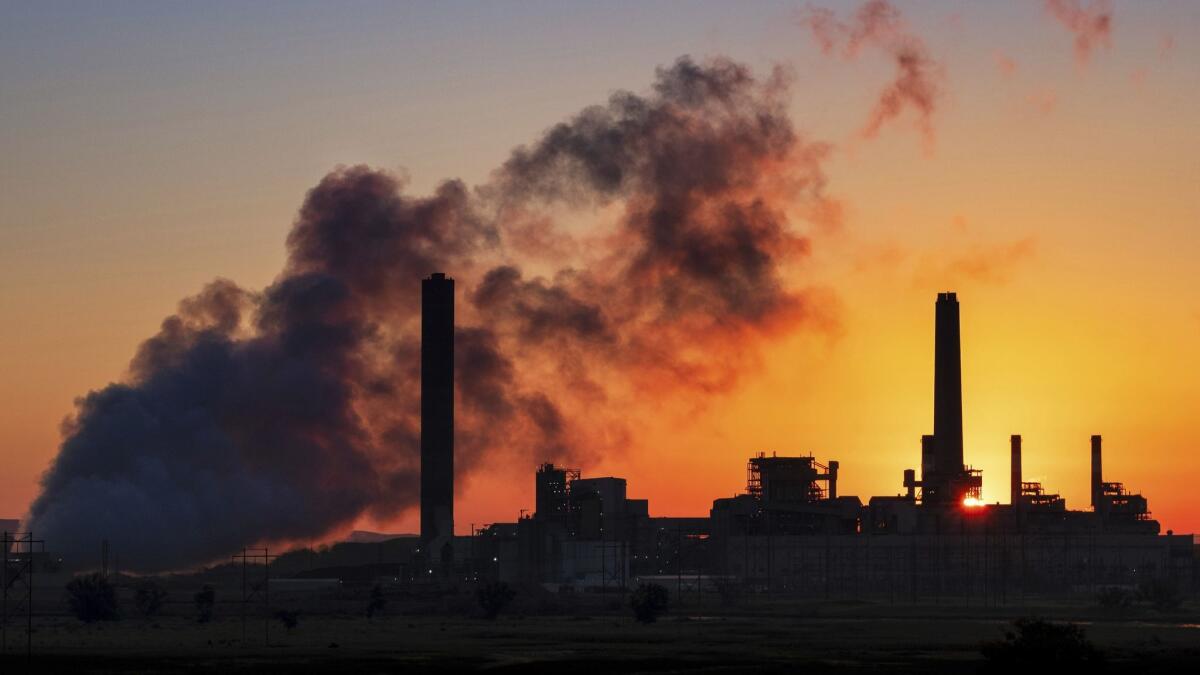Editorial: As global warming continues, Trump wants to burn fossil fuels with an arsonist’s glee

Here’s some disquieting, if unsurprising, news: The world is nowhere near where it needs to be if we are to mitigate the worst effects of global warming. That’s the gist of a report to be delivered this week in South Korea by the Intergovernmental Panel on Climate Change, an independent body providing scientific analysis on climate change. According to early details given to the Guardian newspaper, the report warns that barring drastic and near-immediate changes in how the world creates energy, uses transportation and grows food, we will fall short of the 2015 Paris agreement goal of limiting the global temperature rise to less than 1.5 degrees Celsius above what it was in pre-industrial times. Currently, the global temperature is nearly 1 degree Celsius above the pre-industrial benchmark.
That means trouble. Glaciers already are melting. The shrinking ice cap could mean an ice-free Arctic in the summertime by the end of the century, a reduction that many scientists believe fuels a feedback loop: The less ice there is, the more solar energy the Arctic absorbs, increasing the water temperature and reducing the amount of ice still farther. That phenomenon, experts warn, will likely skew the path of the jet stream with profound climate impacts across the northern hemisphere.
Humanity is spinning pell-mell toward self-inflicted disaster, and the largest economy in the world has official policies to ignore it.
Worse, the melting of glaciers raises the level of the ocean (melting Arctic ice doesn’t do that since the cap floats on the sea). The ice sheet covering Greenland has been melting at an increasing rate since 2003, a function, scientists believe, of a change in wind patterns. Summer winds used to bring cold Arctic air over Greenland in the summer; in 2003, the pattern shifted and since then warm southern air has moved across the massive island, speeding up glacier melt. The current rate of global ice melt will raise the seas by 2 feet over the next 80 years, according to a report earlier this year.
What will all this mean for man and the planet on which he resides? Without a massive global effort to change how we create energy, we can expect worse droughts. Stronger storms. More flooding. In short, extreme weather will become even more extreme, with dramatic potential impacts on the inhabitability of large sections of the world. Low-lying ocean islands will be covered by the sea. Coastal zones worldwide will be forced into retreat. Species will disappear, food chains will become disrupted, wars over water and space and human migration will break out. The more scientists delve into the warming phenomenon, the more they learn — and the more they are surprised by — how fast it’s happening and how much worse the repercussions will be if we go on as we have been.
Enter the Fray: First takes on the news of the minute from L.A. Times Opinion »
Under the Paris climate pact, world leaders committed to limiting the rise in global temperature to 2 degrees above the pre-industrial era, but with an aspiration to limit it to 1.5 degrees.
Even the Trump administration, which wants to burn fossil fuels with an arsonist’s glee, has acknowledged the impacts of climate change in official reports, though it defies and occasionally denies the science of climate change in formal policies and statements. Remember, President Trump wants to withdraw the U.S. from the Paris agreement, which would make us the only — only — country in the world to not be a part of it. Yet a pending draft report from the National Highway Traffic Safety Administration defending Trump’s desire to freeze fuel efficiency standards for cars and light trucks predicts that global temperatures will rise by 4 degrees Celsius over pre-industrial levels by the end of the century. Incongruously, the report argues that since the world is baking anyway, higher emissions from cars and light trucks won’t make much difference. And the Pentagon recognizes that rising seas threaten military bases, particularly naval installations, around the globe. But the administration seeks to make the problems worse rather than take steps to combat them.
Humanity is spinning pell-mell toward self-inflicted disaster, and the largest economy in the world — the country with the second highest industrial output — has official policies to ignore it. Indeed, the U.S. plans to add to the problem for the sake of short-term energy sector financial gains. Whether Trump’s policies are bred of ignorance or cynicism, they push the nation — and the planet — into ever-more dangerous territory.
Follow the Opinion section on Twitter @latimesopinion or Facebook
More to Read
A cure for the common opinion
Get thought-provoking perspectives with our weekly newsletter.
You may occasionally receive promotional content from the Los Angeles Times.










